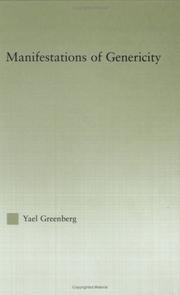| Listing 1 - 3 of 3 |
Sort by
|
Book
ISBN: 0191637041 9780191637049 9780191745775 0191745774 9780199691807 0199691800 0199691819 9780199691814 129993983X Year: 2013 Publisher: Oxford Oxford university press
Abstract | Keywords | Export | Availability | Bookmark
 Loading...
Loading...Choose an application
- Reference Manager
- EndNote
- RefWorks (Direct export to RefWorks)
This book provides an up-to-date introduction to the study of generics. It gathers new work from senior and young researchers and is organized along three main areas of study: the generic and individuals; genericity and time; and the sources of genericity and types of judgment.
Genericalness (Linguistics). --- Pragmatics. --- Semantics, Comparative. --- Genericalness (Linguistics) --- Pragmatics --- Semantics, Comparative --- 801.56 --- Comparative semantics --- Grammar, Comparative and general --- Pragmalinguistics --- General semantics --- Language and languages --- Logic, Symbolic and mathematical --- Semantics (Philosophy) --- Generic (Linguistics) --- Generic grammatical category --- Generic term (Linguistics) --- Linguistics --- 801.56 Syntaxis. Semantiek --- Syntaxis. Semantiek --- Semantics --- Philosophy --- Psycholinguistics

ISBN: 0415967775 0415861373 9786610175680 1135885664 1280175680 0203010191 1135885656 9780203010198 9780415967778 6610175683 9781135885663 9781135885618 1135885613 9781135885656 9780415861373 Year: 2003 Publisher: New York (N.Y.): Routledge
Abstract | Keywords | Export | Availability | Bookmark
 Loading...
Loading...Choose an application
- Reference Manager
- EndNote
- RefWorks (Direct export to RefWorks)
In this book, Yael Greenberg discusses and clarifies a number of controversial issues and phenomena in the generic literature, including the existence of ""episodic genericity,"" existential presuppositions, and contextual restrictions of generics.
Genericalness (Linguistics) --- Grammar, Comparative and general --- Pragmatics --- Semantics --- Formal semantics --- Semasiology --- Semiology (Semantics) --- Comparative linguistics --- Information theory --- Language and languages --- Lexicology --- Meaning (Psychology) --- Pragmalinguistics --- General semantics --- Logic, Symbolic and mathematical --- Semantics (Philosophy) --- Syntax --- Sentences (Grammar) --- Generic (Linguistics) --- Generic grammatical category --- Generic term (Linguistics) --- Linguistics --- Sentences --- Philosophy --- Philology --- Grammar, Comparative and general Syntax --- Semantics. --- Pragmatics. --- Sentences. --- Syntax.
Book
ISBN: 1461495393 1461495385 Year: 2014 Publisher: New York, NY : Springer New York : Imprint: Springer,
Abstract | Keywords | Export | Availability | Bookmark
 Loading...
Loading...Choose an application
- Reference Manager
- EndNote
- RefWorks (Direct export to RefWorks)
How are abstract concepts and words represented in the brain? That is the central question addressed by the authors of “Words as Social Tools: An Embodied View on Abstract Concepts”. First, they focus on the difficulties in defining what abstract concepts and words are, and what they mean in psycholinguistic research. Then the authors go on to describe and critically discuss the main theories on this topic with a special emphasis on the different embodied and grounded theories proposed in cognitive psychology within the last ten years, highlighting the advantages and limitations of each of these theories. The core of this Brief consists of the presentation of a new theory developed by the authors, the WAT (Words As social Tools) view, according to which both sensorimotor (such as perception, action, emotional experiences) and linguistic experiences are at the basis of abstract concepts and of abstract word representation, processing and use. This theory assigns a major role to acquisition: one of the assumptions the authors make is that the different ways in which concrete and abstract words are acquired constrain their brain representation and their use. This view will be compared with the main existing theories on abstractness, from the theory of conceptual metaphors to the theories on multiple representation. Finally, the volume illustrates recent evidence from different areas (developmental, behavioral, cross-cultural, neuropsychological and neural) which converge with and support the authors' theory, leading to the conclusion that in order to account for representation and processing of abstract concepts and words, an extension of embodied and grounded theories is necessary.
Definiteness (Linguistics) --- Genericalness (Linguistics) --- Linguistics. --- Abstraction. --- Abstract thought --- Cognition --- Logic --- Thought and thinking --- Linguistic science --- Science of language --- Language and languages --- Generic (Linguistics) --- Generic grammatical category --- Generic term (Linguistics) --- Linguistics --- Indefiniteness (Linguistics) --- Grammar, Comparative and general --- Determiners --- Consciousness. --- Psychology, clinical. --- Psycholinguistics. --- Cognitive Psychology. --- Neuropsychology. --- Language, Psychology of --- Psychology of language --- Speech --- Psychology --- Apperception --- Mind and body --- Perception --- Philosophy --- Spirit --- Self --- Psychological aspects --- Cognitive psychology. --- Neurophysiology --- Psychophysiology --- Psychology, Cognitive --- Cognitive science
| Listing 1 - 3 of 3 |
Sort by
|

 Search
Search Feedback
Feedback About UniCat
About UniCat  Help
Help News
News